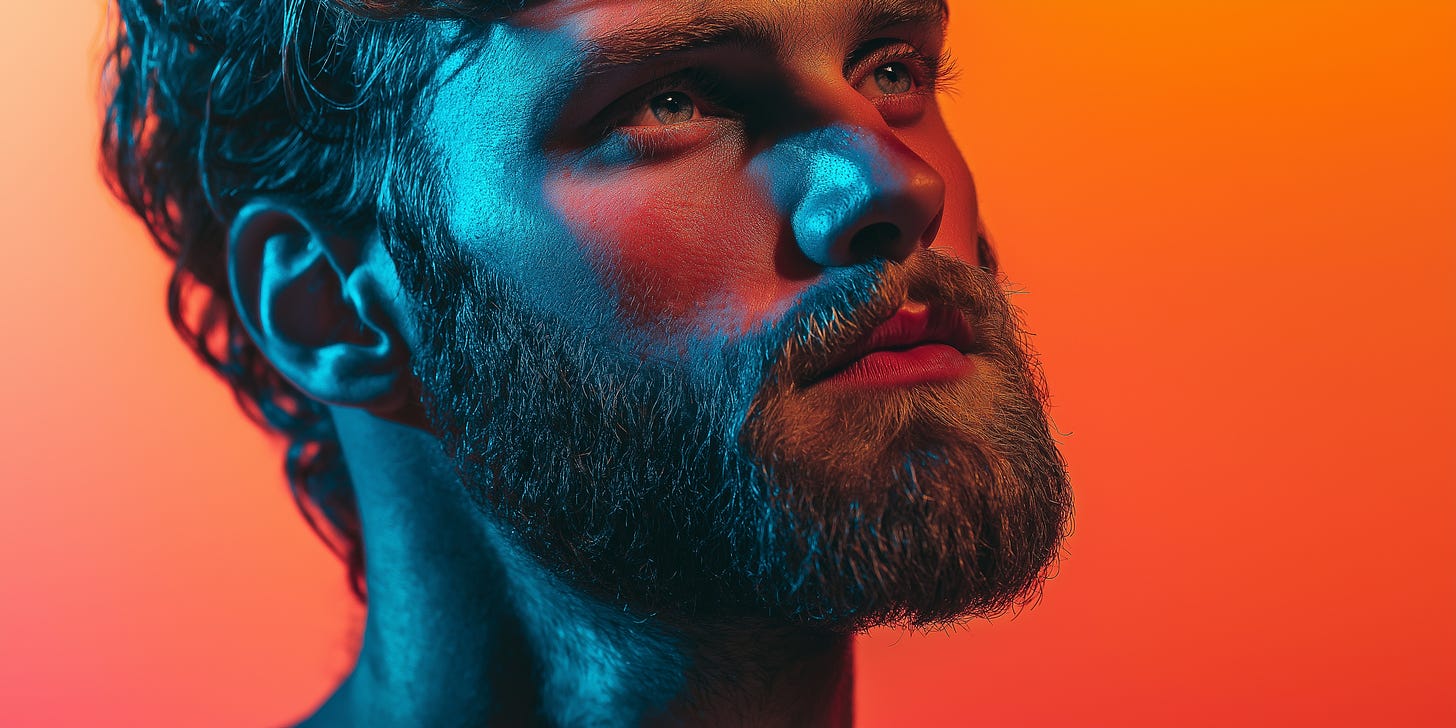When I tell people that it’s harder to be gender non-conforming as a man, they often don’t believe me.
I don’t remember when I first heard that we punish men more for acting like women than we punish women for acting like men. Did I balk back then?
Today, it just seems obviously true.
As Celeste Davis put it:
The box labeled “socially acceptable ways to be a man” is much smaller than the box labeled “socially acceptable ways to be a woman.”
The masculine is at the top of the power hierarchy, but their behavior is more limited. Men’s behavior is limited to the masculine, but women have access to both masculine and feminine behavior.
This disparity is very relevant to the “male loneliness” discourse.
“It's hard to make friends when all the ingredients necessary to friendship--vulnerability, compassion and thoughtfulness-- are seen as a threat to masculinity,” Davis wrote.
Too many feminists, imo, equate asking whether men are more lonely than women on average to elevating men or “himpathy.”
My goal in having written so much about whether and how masculinity norms contribute to male loneliness is to question the utility of gender itself. (Shoutout to the individual who described “the epidemic of male loneliness” as “a made-up problem fueled by male supremacists and white supremacists.”)
I thought that a question Nicholas posed in his comment on a recent post of mine might be illuminating. Or, at least interesting. Do gay men have higher quality relationships than straight men on average?
We can say that gay men perform masculinity differently than straight men, on average. Does that help them feel less lonely?
Even before I started looking for evidence, I anticipated that homophobia might skew the results.
I was more right than I knew.
On average, gay men are more lonely than straight men. The same is true for gay women. Homophobia seems to be most of the reason. This helps answer the relationship quality question because loneliness and the number and quality of one’s interpersonal relationships are strongly correlated (duh).
Even the other factors that contribute to gay loneliness are all connected to various forms of homophobia, including gay folks’ greater likelihood of being unpartnered, living alone, not having kids, and having comorbid illnesses such as HIV/AIDS. Homophobia is also a major reason gays get less support from and are less close to their biological families.
Anti-gay discrimination comes in subtler forms as well.
For example, we define and privilege the “nuclear family” in a fundamentally heterocentric way. We prioritize biological ties over the found family and peer networks upon which gays disproportionately rely. Most countries defined “household” for COVID social distancing as a cohabitating nuclear family.
Heterocentrism and compulsory heterosexuality are just too powerful and ubiquitous to allow researchers to separate their impact on gay loneliness from that of masculinity/gender.
Another wrinkle is that while gay men perform masculinity differently, in some ways many gay men feel more pressure to perform some aspects of masculinity than straight men. For example, anecdotally, more masculine presenting men get a lot more attention on gay dating apps. Similarly, the average gay man seems to prioritize a partner having a muscular, low-fat body than the average woman. Men in general care more about their partner’s looks than women. Maybe gay muscle-man fans are just a very loud minority. More research needed.
It was interesting, at least to me, that several of the studies referenced above showed that gay men are lonelier on average than lesbians or straight men and women.
Is that because gay men experience more homophobia? They do. Gay men also stigmatize themselves more than lesbians.
Also, while everyone tends to hold more homophobia toward homosexuals of their own gender, men are still more homophobic than women overall.
Another interesting but very much unsurprising fact: Homophobia correlates with hostile sexism against women and with traits strongly associated with misogyny, including sexual conservatism and religious fundamentalism.
“Sex-role stereotyping—the tendency to sex-type behaviors and occupations as either exclusively masculine or exclusively feminine—is central to both sexism and homophobia,” the authors of one study wrote. “Individuals who hold strong sex-role stereotypes tend also to hold negative and prejudicial beliefs toward women, and they tend to see homosexuality as a violation of these stereotypical sex-roles.”
In short, a lot of antipathy for homos arises from the fact that they aren’t meeting our gendered expectations. That’s why people who are really emotionally invested in gender tend to be more homophobic. And homophobes tend to be more upset about male gays than lesbians because gays are men who perform femininity whereas lesbians are women performing masculinity. People who hate homos more also tend to hate women more. Which is, obviously, all part of why they’re so much more upset when men act like women than when women act like men. Men are good, you see. And women are bad.
(Insert all the caveats here about how everyone is an individual snowflake and exceptions exist and I’m only describing averages.)
Gender, you see, actually hurts most men.
It only takes a few men who are hell bent on punishing men who act feminine to change male behavior. If one patriarch threatens to kick his son out of the house if he comes out as gay it really doesn’t matter how the mom and siblings feel. One schoolyard bully kicking a gay boy’s ass for talking like a queer will negate all the loving acceptance from everyone else. That gay boy, and every straight boy along with him, will perform masculinity at least well enough to stay housed and unmolested.
“Patriarchy is a system set up by a few men that allows for the most greedy, aggressive and selfish to rise to the top and dominate over everyone else,” Davis wrote.
Top-half men can more safely perform femininity because they don’t need gender to justify or improve their place in the social hierarchy.
Here’s my question to those who doubt that it’s worse to be a feminine man than a masculine woman in the United States and that this matters for male loneliness: How do you explain “no homo?”
When have you ever heard a woman say “no homo” before hugging her same-gender friend or giving her a compliment? Never, you say? Exactly, chungus.
“We talk about patriarchy not because we hate men,” Davis wrote. “We talk about patriarchy because we love men.” We want to “smash the too-small box that is making men lonely and sick and estranged from the full range of their humanity.”
I’d love for men and women alike to start loving men by becoming more willing and able to see and acknowledge that gender is a box that looks different for men and women.








Even as a small child I was totally aware that I could be obsessed with the Ninja Turtles and dress up as Luke Skywalker for Halloween and it was adorable whereas a boy who would get made fun of for loving Barbie and probably not even allowed to dress as Ariel. Girls have access to the whole rainbow, but for boys pink is forbidden. I don't see how it's not obvious.
The only wrinkle is that I think women are punished a lot more for not adhering to beauty standards and even given less room to participate in "masculine" activities if they aren't first and foremost traditionally pretty.
I totally believe the studies you link to-- but I do note that several of them are based on data from the 1990s and early 2000s. I wonder how the results would hold up if re-surveyed today; social attitudes toward homosexuality have changed a lot in the last 20 years (to be clear, I'm not saying homophobia isn't still a significant problem, only that the extent of the problem really has changed).